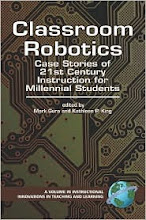Robotic arm (From
Wikipedia, the free encyclopedia) - A robotic arm is a type of mechanical arm, usually programmable,
with similar functions to a human arm; the arm may be the sum total
of the mechanism or may be part of a more complex robot.
The links of such a manipulator are connected by joints allowing either
rotational motion (such as in an articulated robot) or translational (linear)
displacement.[1][2] The links of the manipulator can be
considered to form a kinematic chain.
The terminus of the kinematic chain of the manipulator is called the end effector and it is analogous to the human hand.
"...an arm has 3 hinge points: the shoulder, the elbow and the wrist.
Because we have these 3 hinge points we can move freely in an area."
Nice time! Remember those Afghan girls who just wanted to come over here to compete in a robotics competition and were denied visas to do so? They arrived last night!
image: https://img.wonkette.com/wp-content/uploads/2017/07/Screen-Shot-2017-07-15-at-11.37.40-AM.png
 Hooray! That is nice for them! Hope they win!
Hooray! That is nice for them! Hope they win!
While they were not issued the business visas they needed, Donald Trump “intervened” and the Department of Homeland Security allowed the girls in on a system known as “parole” which would allow them to stay here for ten days without a visa.
image: https://img.wonkette.com/wp-content/uploads/2017/07/Screen-Shot-2017-07-15-at-11.40.43-AM.png
 And for this, Kellyanne Conway is showering him with praise, about how others talk, and talk, and talk” and he ACTS.
And for this, Kellyanne Conway is showering him with praise, about how others talk, and talk, and talk” and he ACTS.
image: https://img.wonkette.com/wp-content/uploads/2017/07/Screen-Shot-2017-07-15-at-11.40.43-AM.png
 Yeah! Good for him! What a good boy! Way to DO things! You
know, except for the fact that he caused the damn problem in the first
place.
Yeah! Good for him! What a good boy! Way to DO things! You
know, except for the fact that he caused the damn problem in the first
place.
As ThinkProgress notes:
image: https://img.wonkette.com/wp-content/uploads/2017/07/Screen-Shot-2017-07-15-at-12.04.30-PM.png
 If you unleash a truckload of angry bees on a group of people, and then hand one
of them a Band-Aid, you are not a fabulous humanitarian. That’s not you
doing the decent or right thing. You don’t get praise for that. You get
praise when you take a moment and consider that perhaps — just perhaps —
it was a poor idea to unleash that truckload of bees in the first
place..."
If you unleash a truckload of angry bees on a group of people, and then hand one
of them a Band-Aid, you are not a fabulous humanitarian. That’s not you
doing the decent or right thing. You don’t get praise for that. You get
praise when you take a moment and consider that perhaps — just perhaps —
it was a poor idea to unleash that truckload of bees in the first
place..."
image: https://img.wonkette.com/wp-content/uploads/2017/07/Screen-Shot-2017-07-15-at-11.37.40-AM.png
 Hooray! That is nice for them! Hope they win!
Hooray! That is nice for them! Hope they win!While they were not issued the business visas they needed, Donald Trump “intervened” and the Department of Homeland Security allowed the girls in on a system known as “parole” which would allow them to stay here for ten days without a visa.
image: https://img.wonkette.com/wp-content/uploads/2017/07/Screen-Shot-2017-07-15-at-11.40.43-AM.png
 And for this, Kellyanne Conway is showering him with praise, about how others talk, and talk, and talk” and he ACTS.
And for this, Kellyanne Conway is showering him with praise, about how others talk, and talk, and talk” and he ACTS. image: https://img.wonkette.com/wp-content/uploads/2017/07/Screen-Shot-2017-07-15-at-11.40.43-AM.png

As ThinkProgress notes:
Left unmentioned by Conway is the fact the Trump administration is currently fighting in federal court to implement a travel ban that would bar nationals of six Muslim-majority countries from entering the US. Afghanistan isn’t on the list, but Trump’s Islamophobia and visa crackdownare “emblematic of a broader effort to put a chill on Muslims entering the US,” as ABC News put it.Donald Trump likes praise. He is surely enjoying all the praise he is getting for letting these particular girls into the country. It is a lovely PR moment for him. Except the problem is not simply that these particular girls were not allowed entry into the country for a robotics competition, but the fact that the policies he supports result in that happening in the first place. And that the Gambian robotics team were also initially denied visas.
image: https://img.wonkette.com/wp-content/uploads/2017/07/Screen-Shot-2017-07-15-at-12.04.30-PM.png
 If you unleash a truckload of angry bees on a group of people, and then hand one
of them a Band-Aid, you are not a fabulous humanitarian. That’s not you
doing the decent or right thing. You don’t get praise for that. You get
praise when you take a moment and consider that perhaps — just perhaps —
it was a poor idea to unleash that truckload of bees in the first
place..."
If you unleash a truckload of angry bees on a group of people, and then hand one
of them a Band-Aid, you are not a fabulous humanitarian. That’s not you
doing the decent or right thing. You don’t get praise for that. You get
praise when you take a moment and consider that perhaps — just perhaps —
it was a poor idea to unleash that truckload of bees in the first
place..."







